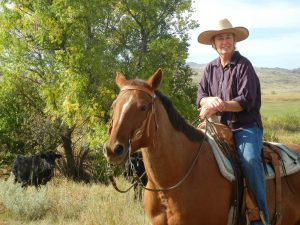One of the greatest privileges of being a bishop in a rural diocese has been my ability to witness the incredible sacrifices people make to ensure their family, their farm, and their community thrive. Wyoming is a great and beautiful state, but there are many factors here—from harsh weather to the remoteness of rural areas—that present challenges to living in the countryside.
Hollywood suggests that “rugged individualism,” captured by someone who is strong, silent, and set apart, is the necessary characteristic for “making it” in the countryside.
But I’ve found that the opposite is true.
“Making it” in rural America takes a group effort, a willingness to sacrifice for the sake of another. The Second Vatican Council teaches us that, because we’re relational beings, one can fully discover his or her true self only in a sincere giving of him or herself. I see this self-giving throughout my diocese, and in a special way in our women.
Take, for instance, Roxie Harris, a rancher from Wheatland, Wyo., whom I recently spoke with. While her husband works a full-time job away from the ranch to provide a needed income and insurance, Roxie keeps the ranch going. She told me that it’s hard work, but she does it because ranching offers a good lifestyle that they want to preserve. The natural cycle of life keeps Roxie and her husband close to God, and has provided a strong work ethic and solid values for their daughter.
Roxie is just one example of the many women in rural America who give tirelessly of themselves for the building up of society and their families. These women care for creation as well as the human family, and their gift of self has passed on the faith to many through the ages.
I think of the women who are wives, mothers, and sisters; religious and lay women who share so much love for the building up of the Church. They have cared for the home, raised children, taught the faith, supported their parishes, worked the farms and ranches, and shown the way for so many of us to grow in virtue and holiness.
The impact of such hard-working and loving women is perhaps felt most within the family. Pope Francis spoke of the origins and reality of such love during an impassioned address to the participants at the recent World Meeting of Families when he said that families united in love create “a society of goodness, of truth, and of beauty.
St. Pope John Paul II taught in his 1988 Apostolic Letter on the Dignity and Vocation of Women that “Christ’s attitude to women confirms and clarifies, in the Holy Spirit, the truth about the equality of man and woman. One must speak of an essential ‘equality,’ since both of them—the woman as much as the man—are created in the image and likeness of God. Both of them are equally capable of receiving the outpouring of divine truth and love in the Holy Spirit. Both receive his salvific and sanctifying ‘visits.’” (Mulieris Dignitatem #16)
While men and women are equal in dignity, we also know that they are distinct, and that human life is incomplete if it’s lacking one or the other. St. John Paul articulated a “feminine genius,” referring to the unique and distinctive characteristics that women possess as women. Part of the feminine genius is the ability of women to receive these sanctifying ‘visits’ that St. John Paul talks about; their openness to others, and their great capacity to share compassion, love, care and concern, be that for the gifts of creation or especially their love for God and their neighbor.
So thank you, rural women, for sharing your many gifts and for the invaluable and irreplaceable contribution you make to the Church, your families and your communities.
For more on this topic, check out the website for Catholic Rural Life.
+pde
0